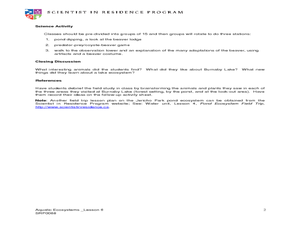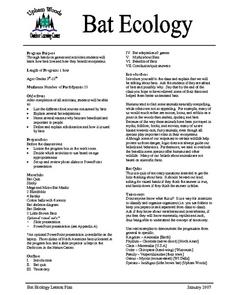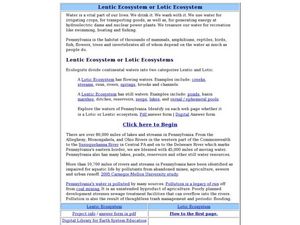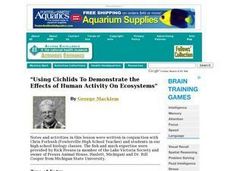Curated OER
Lake and Pond Study
Students examine the habitat and community structure of a pond that could support Ospreys through games and worksheets. They then go on a field trip to a pond to evaluate the suitability of the pond as an Osprey habitat.
Curated OER
Pond Life Identification Kit
Students explore ecology and biodiversty. They use the wet-mount procedure to make several slides to view using the microscope and draw what they see.
Curated OER
Creatures in Torch Lake
Learners investigate pond ecology. They gather water samples from various sources, add grass, and let it sit for a week. Afterward, using microscopes, they identify the microorganisms present in the sample.
Forest Foundation
The Web of Life
Producers, herbivores, carnivores, omnivores, decomposers. To begin a study of the forest ecosystem, learners examine the connections among the members of ecological communities.
Curated OER
Burnaby Lake Field Trip
Learners identify different organisms found in the lake ecosystem. In this life science lesson plan, students discover the predator-prey relationship through a game. They explain how beavers adapt to the environment over time.
Curated OER
Using A Winogradsky Column to Analyze Microbial Communities
Students use easily obtained materials to study ecological succession in a microbiological community. This investigation is appropriate for a variety of age groups. Elementary Students be fascinated by the changes occurring over time...
Curated OER
How Healthy is the Wetland?
Students explore wetlands. In this ecology lesson, students visit a wetland site and collect data about the wetland functions. Students record their results and use the data recorded to rate the wetland site on its function.
Curated OER
Bat Ecology
Students, through hands on games and activities, discover how bats live and how bats benefit ecosystems. They play a game designed to show them how echolocation works and another to show how mother bats locate their young through their...
Curated OER
Inquiry-based Investigations into Pond Water Microorganisms
Young scholars become familiar with common microorganisms and experience exploring the microbial world.
Curated OER
Aquatic Habitat Water Quality Experiment
Fifth graders discuss the importance of water quality for humans and fish and make predictions about what happens to water that is polluted. In small groups, they conduct experiments to compare and contrast water that is unpolluted and...
Curated OER
Sarita Wetland Restoration
Students collaborate on the plannng and implementation of the Sarita Wetland Restoration. The Sarita Wetland is the remnant of former Lake Sarita that was drained in the early 1900's. The goal of the entire project is to improve water...
Curated OER
Lentic Ecosystem or Lotic Ecosystem
Students explore the differences between lentic and lotic ecosystems. In this ecology activity students study the water systems in Pennsylvania.
Curated OER
Fly Tying
Students practice fly tying and explain water conservation efforts in Iowa. In this ecology, Iowa geography, and natural resources lesson, students identify basic equipment and material needed to fish, then tie flies. Students name...
Curated OER
"Using Cichlids To Demonstrate the Effects of Human Activity On Ecosystems"
Students explore the freshwater ecosystem of Africa's Lake Victoria by creating a freshwater aquarium. They investigate factors affecting the aquarium's ecosystem and conduct lab activities.
Curated OER
Fish Haunts
Students examine some of the different ecosystems that fish live in. While doing this they identify the species of fish and the ecological conditions needed for survival. Students use research resources to make fish cards that have...
Curated OER
Using A Winogradsky Column to Analyze Microbial Communities
Learners use easily obtained materials to study ecological succession in a microbiological community. They collect water samples from outdoor sources in plastic bottles to observe and record changes.
Curated OER
Visual Vocabulary
Students interpret and name the vocabulary termed acted out by the mime. In this science/language arts/physical education activity, students are given a set of vocabulary terms to discuss within their group. Next, students place all...
Curated OER
Freshwater Habitats
Students take samples from local freshwater sources and examine them for macroinvertebrate life. They take samples from both shallow and deep freshwater environments, measure temperatures, and classify organisms found in their samples.
Curated OER
Animals Finding Rice Paddies
Fourth graders examine the animals who live in rice paddies and create a chart. In this rice lesson, 4th graders link the types of animals living in each ecosystem with a bar graph. Students use colored bars to show animals that live in...
Curated OER
Ecosystems: What Are They and How Do They Work?
Learners explore the characteristics of major ecosystems, the interactions of the organisms within the systems, and the effects of humans on the system. Both living and non-living components are examined in this five lesson unit.
Other
Adopt a Pond Wetland Curriculum Resource
The Adopt-A-Pond Program was created by the Toronto Zoo for teachers looking for a guide to wetland issues and resources.
Center for Innovation in Engineering and Science Education, Stevens Institute of Technology
Ciese Collaborative Projects: Bucket Buddies: Environmental Study
Bucket Buddies is an opportunity for students to participate in a world-wide environmental study. By identifying organisms in pond water, participating classes can compare their findings, and look for relationships in data. In addition...























